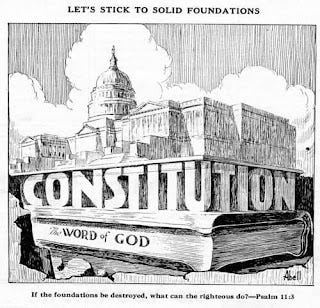What Can the Righteous Do?
I do not believe one can adequately understand the Bible simply by reading it. Now reading is a fine start. But until one casts the face value of biblical expressions into the physical world, and deeply considers all that bounces back, frankly, pondering the Bible is largely an academic undertaking. Don’t get me wrong. Yes, read the Bible. Read it to your kids. Go to church and take them with you. Provide children an academic foundation for expanding their understanding later on. But just expect that any higher meaning the Bible offers will only arise from a spiritual understanding, founded in one’s unique life experiences and relationship with God, not a mental one based solely on academic study. And most kids and many adults are not ready to understand deep, spiritual wisdom, just saying.

And to receive spiritual wisdom, of course one must engage the spirit. But doing so while earning a living among life’s distractions may be easier said than done. Enter suffering. Suffering adversity during man’s temporal, physical existence finds its higher purpose in offering a reason to look deeper, and to contemplate a more profound meaning in life, beyond what life may seem otherwise. And the longer one is blessed to wander the spatial environment we each inherit, the more opportunity one receives to contemplate the true meaning of life and spiritual matters beyond our given four dimensions. Thus, with age comes wisdom.
And so, considering what the Bible might offer us today, the psalmist wrote, “If the foundations be destroyed, what can the righteous do?” At first blush, the psalmist’s subject and predicate may seem unrelated. In keeping with propositions established above, a child entertaining Psalm 11:3, who has little worldly experience to judge its applications, may find it difficult to draw much benefit from its eternal wisdom. But more on that below.
Now I propose as my thesis today that politics may be the perfect earthly laboratory for the human spirit to receive a deeper understanding of Scripture. The question whether to crucify Jesus, for example, was one answered democratically. Pontius Pilot refused to make that critical judgment on his own authority. Pilot required the people judge the fate of Jesus. Perhaps there is a lesson in that, that democracy, essentially rule by popular opinion, may not be all that some crack it up to be. Democracy, once termed “popular sovereignty” by the esteemed Illinois Senator Stephen Douglass, was the fundamental issue disputed during the Lincoln-Douglas debates of the 1850’s. Douglas held that the question whether one man might justifiably enslave another was one that should be decided democratically. Only the people, in the aggregate, would be able to make such a wise, societal decision. Perhaps we should beware those who describe the American form of government as “democracy.” Our founders knew much better than to authorize our republic to follow unbridled public opinion. After all, the Bible informs us man has a few faults to reconcile, doesn’t he?
But if the psalmist is correct, and for our purposes let’s just assume he is, then we can conclude that while it is practically unavoidable that mankind, in the countless alliances the earth divides geographically, must somehow base its various political systems, designing those systems however it might, it is instructive to recognize that in 1776 the American founders chose one enduring precept, directly from Scripture, as the foundation for their new nation. And that would be the precept of truth, which is self-evident. The Apostle John made it clear, that to worship God, one must engage the spirit and speak truth. Perhaps truth is the only language the spirit can understand. Consider then that our founding fathers designed the American political system as one that is spiritual in nature, and when operated in accordance with its founding precept, vicariously worships God, an activity righteous and pleasing in God’s sight.
Recalling again the words of the psalmist, if one were to attempt to destroy the American design of our founders, one must somehow destroy truth. Without its imparted foundation of truth, America dies. Without truth as cement, America’s foundation crumbles.
Now the fastest way to destroy truth is subtly redefining it. Rather than absolute, you make truth relative to the observer. That way, all truth is created equal. My truth is always valid, and yours, which conflicts with mine, is also just as valid. Because all truth registers the same, societal decisions can be controlled by manipulating public perceptions of truth, thus altering opinions, coalescing similar opinions into groups, and organizing like-minded groups into voting constituencies. Because no truth is better than any other, even those on the fringes, for example those born one gender but insist they are another, express truth just as valid as those for whom traditional gender definitions described in the Bible, are fundamental.
Once one has made truth relative to the observer, one would do the same with the America’s constitutional definitions. The result would be a “living and breathing” Constitution, the definitions of which would be molded into any meanings political advantage might require. Along with a wholly redefined, relativistic Constitution arrives a plethora of possible destructive governmental policies, perhaps even eradicating national boundaries.
And finally, one would saturate the population with fake news, even legalizing the use of government propaganda against the American people. The result would be overwhelming societal confusion, societal breakdown, the last, best hope of earth, America, destroyed.
And so the question I will leave you to consider today is, indeed, what can the righteous do?



